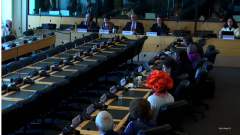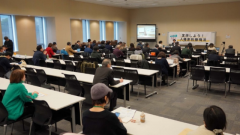UN: CERD adopted concluding observations of Andorra, Guatemala, Hungary, Lithuania and Zambia
May 13, 2019
On the 10th of May, the UN Committee on the Elimination of Racial Discrimination (CERD) concluded its 98th session. At the session, CERD adopted concluding observations on Andorra, Guatemala, Hungary, Lithuania and Zambia. *Recommendations with asterisks [*] are one-year follow-up recommendations.
Concluding observations, reports of the States parties and other stakeholders are available at the OHCHR website ![]() . Video archives of the public meetings with the States parties can be accessed at UN Web TV
. Video archives of the public meetings with the States parties can be accessed at UN Web TV ![]() .
.
The Committee adopted follow-up letters ![]() to the Governments of Australia, Ecuador, Kuwait, Pakistan and Serbia. Under the Early Warning and Urgent Action Procedure
to the Governments of Australia, Ecuador, Kuwait, Pakistan and Serbia. Under the Early Warning and Urgent Action Procedure ![]() , the Committee issued letters to six countries. The letters will be posted on the OHCHR website in due course.
, the Committee issued letters to six countries. The letters will be posted on the OHCHR website in due course.
The Committee issued letters to the Governments of Brazil, Canada, Cameroon, Chile, India, Latvia and the United States of America under its Early Warning and Urgent Action Procedure.
_
Andorra
 The Committee welcomed the recent adoption of the law on equality and non-discrimination and the creation of the Equality Services as results of the white paper on equality and non-discrimination. The Committee inquired about the progress in establishing an independent national human rights institution in line with the Paris Principles. Concerning migrants including refugees and asylum-seekers, the Committee drew its attention to the provision of legal aid, rights of children of migrant parents, ratification of the International Convention on the Protection of the Rights of All Migrant Workers and Members of Their Families (ICMW), and the right to nationality. The Committee asked a number of questions concerning the justice system including the domestic application of ICERD, the consideration of racial discrimination as an aggravating circumstance to crime and the legal framework to counter racist hate speech. The Committee requested for information on Roma people in the country and racial discrimination in employment. The State party was encouraged to promote human rights education for mutual understandings and non-discrimination including the teaching of Roma history and activities to celebrate the International Decade for People of African-descent. The Committee requested the State party to share information on measures against multiple and intersecting forms of discrimination. Read more (English/ French)
The Committee welcomed the recent adoption of the law on equality and non-discrimination and the creation of the Equality Services as results of the white paper on equality and non-discrimination. The Committee inquired about the progress in establishing an independent national human rights institution in line with the Paris Principles. Concerning migrants including refugees and asylum-seekers, the Committee drew its attention to the provision of legal aid, rights of children of migrant parents, ratification of the International Convention on the Protection of the Rights of All Migrant Workers and Members of Their Families (ICMW), and the right to nationality. The Committee asked a number of questions concerning the justice system including the domestic application of ICERD, the consideration of racial discrimination as an aggravating circumstance to crime and the legal framework to counter racist hate speech. The Committee requested for information on Roma people in the country and racial discrimination in employment. The State party was encouraged to promote human rights education for mutual understandings and non-discrimination including the teaching of Roma history and activities to celebrate the International Decade for People of African-descent. The Committee requested the State party to share information on measures against multiple and intersecting forms of discrimination. Read more (English/ French)![]() . In its concluding observations
. In its concluding observations ![]() , the Committee issued recommendations concerning following areas:
, the Committee issued recommendations concerning following areas:
- Collection of statistical data;
- Application of the Convention in the domestic legal order;
- Legislation and definition of racial discrimination;
- Institutional framework;
- National human rights institution;
- Complaints of racial discrimination;
- Aggravating circumstance for racially motivated crimes;
- Access to citizenship;
- Situation of women belonging to vulnerable groups*;
- Discrimination in access to employment;
- Trafficking in persons;
- Refugees and asylum seekers*; and
- Discriminatory stereotypes in the media.
Guatemala
 While the State party’s draft bill on human rights defenders was considered as a potential step forward, the Committee expressed concerns on the situation of human rights defenders, especially indigenous rights defenders, who have reportedly been subject to attacks including criminalisation and stigmatisation. The Committee raised concerns on the interlinkages of poverty, corruption and structural discrimination against indigenous peoples and people of African-descent in their enjoyment of economic, social and cultural rights. The State party was asked how it ensures the access to justice, education and health services in indigenous languages. The Committee raised a number of questions on multiple and intersecting forms of discrimination such as violence against indigenous women and girls including enforced disappearances, malnutrition of indigenous children and forced sterilisation of indigenous persons with disability. The Committee shared concerns with the State party on reports of the lack of free, prior and informed consent (FPIC) with indigenous peoples and people of African-descent and forced evictions from their ancestral land for mega projects. Further on business and human rights, the Committee requested the State party to provided information about measures against labour exploitation of indigenous peoples in the palm oil plantations and other industries. The State party received a series of questions on its justice system and legal framework such as domestic application of ICERD, the status of indigenous jurisdictions in ordinary courts, police violence against indigenous peoples and people of African-descent. The Committee encouraged the State party to strengthen national institutions to combat structural racial discrimination and promote representation of indigenous peoples and people of African-descent including in media. Read more (English/ French)
While the State party’s draft bill on human rights defenders was considered as a potential step forward, the Committee expressed concerns on the situation of human rights defenders, especially indigenous rights defenders, who have reportedly been subject to attacks including criminalisation and stigmatisation. The Committee raised concerns on the interlinkages of poverty, corruption and structural discrimination against indigenous peoples and people of African-descent in their enjoyment of economic, social and cultural rights. The State party was asked how it ensures the access to justice, education and health services in indigenous languages. The Committee raised a number of questions on multiple and intersecting forms of discrimination such as violence against indigenous women and girls including enforced disappearances, malnutrition of indigenous children and forced sterilisation of indigenous persons with disability. The Committee shared concerns with the State party on reports of the lack of free, prior and informed consent (FPIC) with indigenous peoples and people of African-descent and forced evictions from their ancestral land for mega projects. Further on business and human rights, the Committee requested the State party to provided information about measures against labour exploitation of indigenous peoples in the palm oil plantations and other industries. The State party received a series of questions on its justice system and legal framework such as domestic application of ICERD, the status of indigenous jurisdictions in ordinary courts, police violence against indigenous peoples and people of African-descent. The Committee encouraged the State party to strengthen national institutions to combat structural racial discrimination and promote representation of indigenous peoples and people of African-descent including in media. Read more (English/ French)![]() . NGO meeting (English/ French)
. NGO meeting (English/ French)![]() . In its concluding observations
. In its concluding observations ![]() , the Committee issued recommendations concerning following areas:
, the Committee issued recommendations concerning following areas:
- Compilation of statistics;
- Legislation*;
- Institutional measures;
- Structural discrimination;
- Armed conflict and peace agreements*;
- Incitement to discrimination and racial hatred;
- Prior consultation;
- Lands, territories and natural resources;
- Xinka people;
- Freedom of expression;
- Human rights defenders;
- Political participation;
- Labour rights;
- Situation of indigenous and Afro-descendant women;
- Multiple forms of discrimination; and
- Access to justice.
_
Hungary
 Although the Committee regonised the existing legal framework to combat racial discrimination including the Equal Treatment Act, the Committee encouraged the State party to align the definition of racial discrimination with ICERD by including ethnicity and descent as prohibited grounds of discrimination. The State party was asked to provide detailed information on the justice system such as domestic application of ICERD, reversal of burden of proof, independence of justice, and disaggregated prison population. The Committee was alerted by reports of racist hate speech against migrants by politicians, and it asked about counter-measures. The Committee inquired the State party about the protection of vulnerable groups from racist hate crimes through providing training for law enforcement officers and properly punishing perpetrators. The Committee shared its concerns with the State party on continuing discrimination and segregation of Roma in education, housing and employment, as well as the lack of representation in national institutions and media. Due to the existence of varying statistics, the State party was asked to clarify the actual number of Roma population in the country. The State party received a number of questions on the treatment of refugees and asylum-seekers such as ensuring the access to education and psychosocial services, conditions in the transit zones including the access to asylum process and the freedom from arbitrary detention. The Committee requested for further information on human rights education to promote mutual understandings and tackle racial discrimination including the teaching of histories of Jews and Roma. Questions were raised on civil society space to fight against racial discrimination Read more (English/ French)
Although the Committee regonised the existing legal framework to combat racial discrimination including the Equal Treatment Act, the Committee encouraged the State party to align the definition of racial discrimination with ICERD by including ethnicity and descent as prohibited grounds of discrimination. The State party was asked to provide detailed information on the justice system such as domestic application of ICERD, reversal of burden of proof, independence of justice, and disaggregated prison population. The Committee was alerted by reports of racist hate speech against migrants by politicians, and it asked about counter-measures. The Committee inquired the State party about the protection of vulnerable groups from racist hate crimes through providing training for law enforcement officers and properly punishing perpetrators. The Committee shared its concerns with the State party on continuing discrimination and segregation of Roma in education, housing and employment, as well as the lack of representation in national institutions and media. Due to the existence of varying statistics, the State party was asked to clarify the actual number of Roma population in the country. The State party received a number of questions on the treatment of refugees and asylum-seekers such as ensuring the access to education and psychosocial services, conditions in the transit zones including the access to asylum process and the freedom from arbitrary detention. The Committee requested for further information on human rights education to promote mutual understandings and tackle racial discrimination including the teaching of histories of Jews and Roma. Questions were raised on civil society space to fight against racial discrimination Read more (English/ French)![]() . NGO meeting (English/ French)
. NGO meeting (English/ French)![]() . In its concluding observations
. In its concluding observations ![]() , the Committee issued recommendations concerning following areas:
, the Committee issued recommendations concerning following areas:
- Statistics;
- National human rights institution;
- Anti-discrimination legal framework and its enforcement;
- Complaints of racial discrimination*;
- Racist hate crimes*;
- Racist hate speech;
- Prohibition of organizations that promote racial discrimination;
- Situation of Roma*;
- Situation of asylum seekers, migrants and refugees;
- Non-refoulement and use of force against asylum seekers; and
- Trainings and education on human rights and racial discrimination.
Lithuania
 While the Committee welcomed the State party’s efforts to combat racial discrimination such as the Office of the Inspector of Journalists’Ethics in countering hate speech and the Law on Compensation for Violent Crimes, it identified the need for further measures. On legal and institutional measures, the Committee encouraged the State party to incorporate the definition of racial discrimination in line with Article 1 of ICERD, swiftly adopt the draft law on national minorities, and increase resources for the Seimas Ombudsmen’s Office and the Office of the Equal Opportunities Ombudsperson. The State party was requested to provide disaggregated data of population including people of African descent. The Committee shared its concerns with the State party about racist hate speech in offline and online, including racist hate speech against migrants and Muslims during election campaigns. Regarding hate crimes and acts of racial discrimination, the State party was requested to provide detailed information on training of law enforcement officers, compensations for victims of non-violent crimes, the reversal of burden of proof and consideration of racial discrimination as an aggravating circumstance to crime. The situation of Roma people drew the Committee’s attention, in particular their access to secondary and higher education and health services. The State party was asked about the treatment of refugees and asylum-seekers such as the capacity of reception centres and the access to social security, The Committee encouraged the State party to accelerate the efforts to reduce and end statelessness. Read more (English/ French)
While the Committee welcomed the State party’s efforts to combat racial discrimination such as the Office of the Inspector of Journalists’Ethics in countering hate speech and the Law on Compensation for Violent Crimes, it identified the need for further measures. On legal and institutional measures, the Committee encouraged the State party to incorporate the definition of racial discrimination in line with Article 1 of ICERD, swiftly adopt the draft law on national minorities, and increase resources for the Seimas Ombudsmen’s Office and the Office of the Equal Opportunities Ombudsperson. The State party was requested to provide disaggregated data of population including people of African descent. The Committee shared its concerns with the State party about racist hate speech in offline and online, including racist hate speech against migrants and Muslims during election campaigns. Regarding hate crimes and acts of racial discrimination, the State party was requested to provide detailed information on training of law enforcement officers, compensations for victims of non-violent crimes, the reversal of burden of proof and consideration of racial discrimination as an aggravating circumstance to crime. The situation of Roma people drew the Committee’s attention, in particular their access to secondary and higher education and health services. The State party was asked about the treatment of refugees and asylum-seekers such as the capacity of reception centres and the access to social security, The Committee encouraged the State party to accelerate the efforts to reduce and end statelessness. Read more (English/ French)![]() . In its concluding observations
. In its concluding observations ![]() , the Committee issued recommendations concerning following areas:
, the Committee issued recommendations concerning following areas:
- Statistics;
- National human rights institutions;
- Definition of racial discrimination;
- Hate speech and incitement to hatred*;
- Prosecution of racially motivated crimes;
- Reparations for victims of racially motivated crimes;
- Situation of Roma;
- Law on national minorities*;
- Asylum-seekers*;
- Integration of refugees and beneficiaries of subsidiary protection; and
- Stateless persons.
_
Zambia
 The Committee considered the combined 17th-19th periodic reports in the absence of the State party delegation from the capital. The State party was requested to provide responses and additional information in writing. The Committee asked the State party to provide information missing in the periodic reports such as up-to-date data of population disaggregated by nationality, ethnicity and language, the situation of indigenous peoples including San, outcomes of the new law on human trafficking, and handling of land issues. The State party was encouraged to strengthen its legal framework by adopting the definition of racial discrimination in line with Article 1 of ICERD and enacting a law on equality and discrimination. On complaints of racial discrimination including in the labour market, the Committee asked the State party’s efforts to ensure victims’ access to justice such as the reversal of burden of proof and consideration of racial discrimination as an aggravating circumstance to crime. The State party was asked to share progress in prosecution and convictions of perpetrators of hate crimes against migrants during the xenophobic riots in recent years. On business and human rights, the Committee raised concerns on reports of racial discrimination against black employees and migrants in farms and the mining industry. The Committee expressed concerns on reports of discrimination against people with albinism in employment, health, education and other areas. The State party was encouraged to strengthen its national human rights institution (NHRI) to engage with the UN human rights mechanisms. The Committee asked the State party about a plan to increase the access to education for vulnerable groups as well as human rights education to promote diversity and mutual-understandings. Read more (English/ French)
The Committee considered the combined 17th-19th periodic reports in the absence of the State party delegation from the capital. The State party was requested to provide responses and additional information in writing. The Committee asked the State party to provide information missing in the periodic reports such as up-to-date data of population disaggregated by nationality, ethnicity and language, the situation of indigenous peoples including San, outcomes of the new law on human trafficking, and handling of land issues. The State party was encouraged to strengthen its legal framework by adopting the definition of racial discrimination in line with Article 1 of ICERD and enacting a law on equality and discrimination. On complaints of racial discrimination including in the labour market, the Committee asked the State party’s efforts to ensure victims’ access to justice such as the reversal of burden of proof and consideration of racial discrimination as an aggravating circumstance to crime. The State party was asked to share progress in prosecution and convictions of perpetrators of hate crimes against migrants during the xenophobic riots in recent years. On business and human rights, the Committee raised concerns on reports of racial discrimination against black employees and migrants in farms and the mining industry. The Committee expressed concerns on reports of discrimination against people with albinism in employment, health, education and other areas. The State party was encouraged to strengthen its national human rights institution (NHRI) to engage with the UN human rights mechanisms. The Committee asked the State party about a plan to increase the access to education for vulnerable groups as well as human rights education to promote diversity and mutual-understandings. Read more (English/ French)![]() . In its concluding observations
. In its concluding observations ![]() , the Committee issued recommendations concerning following areas:
, the Committee issued recommendations concerning following areas:
- Data collection;
- Application of the Convention in domestic legislation;
- Definition of racial discrimination;
- National human rights institution;
- Complaints of racial discrimination and remedies;
- Hate crime and hate speech;
- Access to legal aid;
- Special measures to address inequalities;
- Harmful practices;
- Situation of San and Khoe peoples;
- Education;
- Situation of persons with albinism*;
- Trafficking in persons*; and
- Refugees and asylum-seekers.
_
Early Warning and Urgent Action Procedure
 Brazil: The Committee sent a letter
Brazil: The Committee sent a letter ![]() to the State party concerning the building of highways and railroads in the State of Mato Grosso, and its impact on Xavante and other indigenous peoples’s rights. The State party was requested to provide information on the steps taken for: suspending the building of the highway BR-080 and other infrastructure projects on or near the traditional lands and territories until free, prior and informed consent (FPIC) is obtained from all the Xavante indigenous communities affected by these projects; ensuring the consistency with its legislation on the right to consultation and FPIC with the international human rights standards; and restoring the National Indian Foundation (FUNAI) in its functions. The Committee also encouraged the State party to consider seeking assistance from the UN Expert Mechanism on the Rights of Indigenous Peoples (EMRIP).
to the State party concerning the building of highways and railroads in the State of Mato Grosso, and its impact on Xavante and other indigenous peoples’s rights. The State party was requested to provide information on the steps taken for: suspending the building of the highway BR-080 and other infrastructure projects on or near the traditional lands and territories until free, prior and informed consent (FPIC) is obtained from all the Xavante indigenous communities affected by these projects; ensuring the consistency with its legislation on the right to consultation and FPIC with the international human rights standards; and restoring the National Indian Foundation (FUNAI) in its functions. The Committee also encouraged the State party to consider seeking assistance from the UN Expert Mechanism on the Rights of Indigenous Peoples (EMRIP).
_
 Canada: Both communications are in follow-up to the letters sent on 14 December 2018 at the 97th session.
Canada: Both communications are in follow-up to the letters sent on 14 December 2018 at the 97th session.
- The Committee issued a follow-up letter
 to the State party concerning the Trans Mountain Pipeline Expansion Project and its impact on the Secwepemc indigenous peoples. The Committee was concerned about the information that the consultation process would have not been agreed upon with the Secwepemc indigenous peoples and that consultation seems not to be undertaken with all the indigenous communities. The Committee expressed further concerns on the lack of information about the measures taken for obtaining free, prior and informed consent (FPIC). The Committee urged the State party to ensure that no decisions about the Trans Mountain Pipeline Expansion Project are taken without FPIC of the Secwepemc indigenous peoples.
to the State party concerning the Trans Mountain Pipeline Expansion Project and its impact on the Secwepemc indigenous peoples. The Committee was concerned about the information that the consultation process would have not been agreed upon with the Secwepemc indigenous peoples and that consultation seems not to be undertaken with all the indigenous communities. The Committee expressed further concerns on the lack of information about the measures taken for obtaining free, prior and informed consent (FPIC). The Committee urged the State party to ensure that no decisions about the Trans Mountain Pipeline Expansion Project are taken without FPIC of the Secwepemc indigenous peoples. - The Committee issued a follow-up letter
 to the State party concerning the “Recognition and Implementation of Indigenous Rights Framework”. The Committee reiterated its concerns on inadequate information on free, prior and informed consent (FPIC) from indigenous peoples on the Framework, in particular Bill C-91 on indigenous languages, Bill C-92 on indigenous children, youth and families, Bill C-86 and Bill C-97 on the implementation of the budget and other measures, as well as the new rights-based policy announced to be launched in June 2019, in replacement of the Comprehensive Land Claims Policy and the Inherent Right Policy. The Committee urged the State party to ensure that no decisions about the Indigenous Rights Framework and other legislations regarding indigenous peoples are taken without consultation with and their FPIC.
to the State party concerning the “Recognition and Implementation of Indigenous Rights Framework”. The Committee reiterated its concerns on inadequate information on free, prior and informed consent (FPIC) from indigenous peoples on the Framework, in particular Bill C-91 on indigenous languages, Bill C-92 on indigenous children, youth and families, Bill C-86 and Bill C-97 on the implementation of the budget and other measures, as well as the new rights-based policy announced to be launched in June 2019, in replacement of the Comprehensive Land Claims Policy and the Inherent Right Policy. The Committee urged the State party to ensure that no decisions about the Indigenous Rights Framework and other legislations regarding indigenous peoples are taken without consultation with and their FPIC.
_
 Cameroon: The Committee sent a letter
Cameroon: The Committee sent a letter ![]() to the State party concerning the project of a palm oil plantation and its impact on the Bagyeli indigenous peoples, in particular the Bella Nkollo, Gwap and Moungue communities, due to a long-term land lease granted for the company Palm Resources Cameroon SA (Bioplam) over their ancestral land. The Committee requested the State party to provide information on the steps taken to: ensure the right to consultation and free, prior and informed consent of Bagyeli communities affected by the lease; consider providing immediate and comprehensive compensations and reparations, including returns to their lands, for the Bagyeli communities; and consider reviewing the 1974 land law to ensure recognition, protection and titling of indigenous peoples over their traditional lands. The Committee also encouraged the State party to consider seeking assistance from the UN Expert Mechanism on the Rights of Indigenous Peoples (EMRIP).
to the State party concerning the project of a palm oil plantation and its impact on the Bagyeli indigenous peoples, in particular the Bella Nkollo, Gwap and Moungue communities, due to a long-term land lease granted for the company Palm Resources Cameroon SA (Bioplam) over their ancestral land. The Committee requested the State party to provide information on the steps taken to: ensure the right to consultation and free, prior and informed consent of Bagyeli communities affected by the lease; consider providing immediate and comprehensive compensations and reparations, including returns to their lands, for the Bagyeli communities; and consider reviewing the 1974 land law to ensure recognition, protection and titling of indigenous peoples over their traditional lands. The Committee also encouraged the State party to consider seeking assistance from the UN Expert Mechanism on the Rights of Indigenous Peoples (EMRIP).
_
 Chile: The Committee sent a letter
Chile: The Committee sent a letter ![]() to the State party concerning the desecration and destruction of the indigenous sacred site of Chinay. The Committee expressed concerns on allegedly the lack of protection of indigenous peoples’ sacred sites which would amount to the failure of ensuring that indigenous communities can exercise their cultural rights as well as a breach of the State party’s duty to recognise and protect the rights of indigenous peoples to own, develop, control and use their communal lands, territories and resources. The Committee informed the State party that the issue will be discussed in the context of the upcoming review of the 22nd – 23rd periodic reports of the State party.
to the State party concerning the desecration and destruction of the indigenous sacred site of Chinay. The Committee expressed concerns on allegedly the lack of protection of indigenous peoples’ sacred sites which would amount to the failure of ensuring that indigenous communities can exercise their cultural rights as well as a breach of the State party’s duty to recognise and protect the rights of indigenous peoples to own, develop, control and use their communal lands, territories and resources. The Committee informed the State party that the issue will be discussed in the context of the upcoming review of the 22nd – 23rd periodic reports of the State party.
_
 India: The Committee sent a letter
India: The Committee sent a letter ![]() to the State party concerning the Draft National Forest Policy and its impact on the rights of indigenous peoples. The Committee requested the State Party to provide information on the steps taken to: consider the annulation of the Draft National Forest Policy 2018 in order to ensure the rights of indigenous peoples over their traditional lands and territories; refrain from adopting any legislation or policies undermining indigenous peoples’ right; and consider the participation of indigenous peoples in the governance of the Compensatory Afforestation Programme. The Committee also encouraged the State party to consider seeking assistance from the UN Expert Mechanism on the Rights of Indigenous Peoples (EMRIP).
to the State party concerning the Draft National Forest Policy and its impact on the rights of indigenous peoples. The Committee requested the State Party to provide information on the steps taken to: consider the annulation of the Draft National Forest Policy 2018 in order to ensure the rights of indigenous peoples over their traditional lands and territories; refrain from adopting any legislation or policies undermining indigenous peoples’ right; and consider the participation of indigenous peoples in the governance of the Compensatory Afforestation Programme. The Committee also encouraged the State party to consider seeking assistance from the UN Expert Mechanism on the Rights of Indigenous Peoples (EMRIP).
_
 Latvia: The Committee sent a letter
Latvia: The Committee sent a letter ![]() to the State party concerning the new regulation on pre-school education (No. 716) and minority rights. The Committee expressed concerns that this new law may be discriminatory towards ethnic minorities in the field of education, since it provides that the main medium of communication in a play-lesson shall be Latvian, except activities organised with the aim of learning minority’s language and ethnic culture. The Committee reiterated its recommendations to the State party to take measures to ensure that its language policy and laws do not create direct or indirect discrimination or restrict the rights of ethnic minorities to access education, employment and basic services, and reconsider the necessity of amendments to the Law on Education. The Committee requested the State party to ensure that the new regulation No. 716 on pre-school education is in line with the Convention.
to the State party concerning the new regulation on pre-school education (No. 716) and minority rights. The Committee expressed concerns that this new law may be discriminatory towards ethnic minorities in the field of education, since it provides that the main medium of communication in a play-lesson shall be Latvian, except activities organised with the aim of learning minority’s language and ethnic culture. The Committee reiterated its recommendations to the State party to take measures to ensure that its language policy and laws do not create direct or indirect discrimination or restrict the rights of ethnic minorities to access education, employment and basic services, and reconsider the necessity of amendments to the Law on Education. The Committee requested the State party to ensure that the new regulation No. 716 on pre-school education is in line with the Convention.
_
 USA: Concerning the both cases below, the Committee encouraged the State party to engage with the UN Expert Mechanism on the Rights of Indigenous Peoples (EMRIP) and reminded the State party to submit the periodic reports overdue since 20 November 2017, in addition to measures specific to each case.
USA: Concerning the both cases below, the Committee encouraged the State party to engage with the UN Expert Mechanism on the Rights of Indigenous Peoples (EMRIP) and reminded the State party to submit the periodic reports overdue since 20 November 2017, in addition to measures specific to each case.
- The Committee sent a letter
 to the State party concerning the desecration of a burial site of the Kanaka Maolithe indigenous peoples in the State of Hawai’.The Committee requested the State party to provide information on the steps taken to: ensure the right to consultation and free, prior and informed consent to Kanaka Maoli indigenous peoples regarding current and future projects on their traditional lands and territories, including their burial sites; consider adopting comprehensive reparations measures towards the Kanaka Maoli descendants regarding burial desecration of their relatives; and consider reviewing the existing legislation regarding burial.
to the State party concerning the desecration of a burial site of the Kanaka Maolithe indigenous peoples in the State of Hawai’.The Committee requested the State party to provide information on the steps taken to: ensure the right to consultation and free, prior and informed consent to Kanaka Maoli indigenous peoples regarding current and future projects on their traditional lands and territories, including their burial sites; consider adopting comprehensive reparations measures towards the Kanaka Maoli descendants regarding burial desecration of their relatives; and consider reviewing the existing legislation regarding burial. - The Committee sent a letter
 to the State party concerning the construction of the Thirty Meter Telescope, on the Mauna Kea Mountain in the State of Hawai’I, and its impact on the rights of indigenous peoples, the Native Hawaiians. The Committee requested the State party to provide information on the steps taken to: ensure the right to consultation and free, prior and informed consent (FPIC) to Native Hawaiian affected by projects on or near their ancestral lands and territories; consider the suspension of the Thirty Meter Telescope project until FPIC is obtained from Native Hawaiians indigenous peoples; and consider adopting concrete measures to effectively protect the sacred sites of indigenous peoples and review the existing emergency rules in the light of international human rights standards.
to the State party concerning the construction of the Thirty Meter Telescope, on the Mauna Kea Mountain in the State of Hawai’I, and its impact on the rights of indigenous peoples, the Native Hawaiians. The Committee requested the State party to provide information on the steps taken to: ensure the right to consultation and free, prior and informed consent (FPIC) to Native Hawaiian affected by projects on or near their ancestral lands and territories; consider the suspension of the Thirty Meter Telescope project until FPIC is obtained from Native Hawaiians indigenous peoples; and consider adopting concrete measures to effectively protect the sacred sites of indigenous peoples and review the existing emergency rules in the light of international human rights standards.





